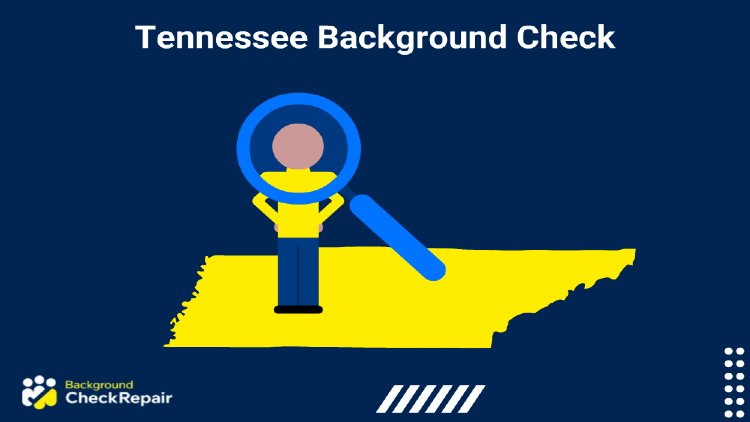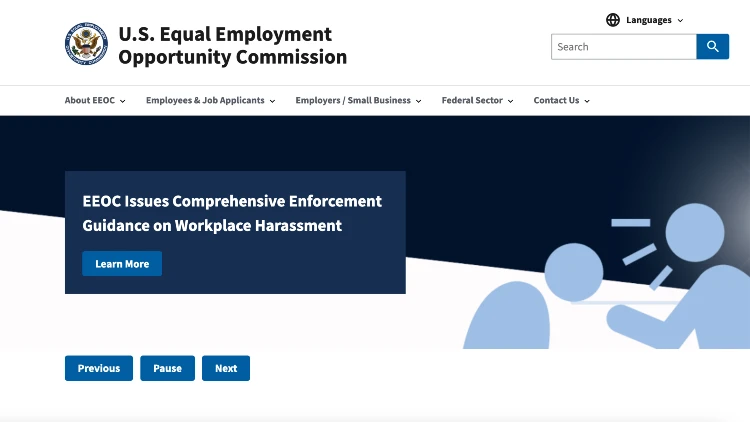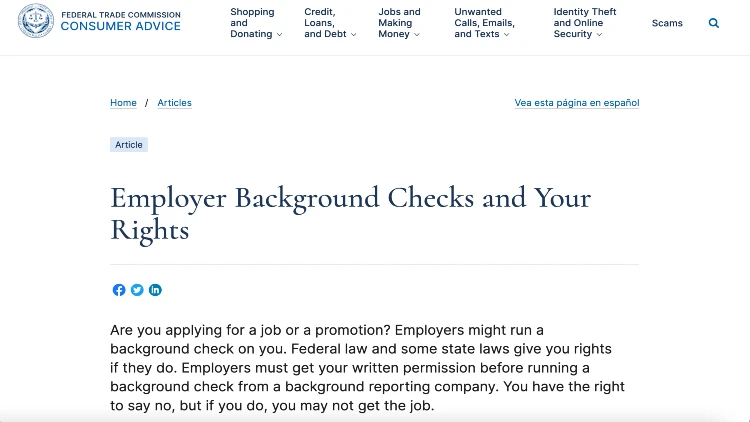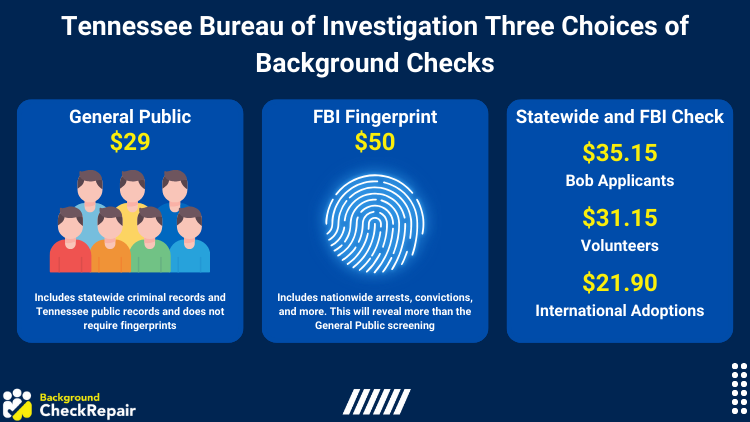
When running a Tennessee background check (TN), there is one important law that employers (and applicants) should know about, because it impacts the information that is used to verify identity and other qualifications. Of course, Tennessee has both state and federal laws that ordain what constitutes acceptable info for background checks, but the social media law is distinctive, and knowing the rights concerning an in-depth background screening and employee history searches in Tennessee can prevent violations, penalties, and lawsuits.
Many background checks also involve reviewing the social media accounts of job applicants and potential employees. Thanks to countless platforms, personal beliefs and opinions are more readily available than in the past, leading many individuals to be more careful concerning what they post since discrimination against personal creed has become more acceptable in society.
This Tennessee background check guide explains what the state has done to preserve Civil Rights, regarding a person’s individual creed (beliefs and guiding principles), and whether it can be used to discriminate during the employment process.
When using social media background checks in Tennessee, there are more protections for individual beliefs than in most other U.S. states. In addition to its state background check laws, in 2014 Tennessee enacted additional legislation relating specifically to social media.
The social media law, known as the Employee Online Privacy Act of 2014, limits what employers can ask potential or current employees about their social media accounts. More specifically, the laws prohibit employers from:
- Requesting or requiring employees to add them as a friend or follower on social media platforms, such as Facebook, Twitter, or Instagram;
- Requesting access to an employee’s social media accounts, via a password or username;
- Requesting that the employee or job candidate show their social media accounts in front of the employer so that they can screen the account, without having access to their password or username;
- Retaliating against an employee who refused to do any of the above.1
While these protections are helpful to employees who want to keep their social media private, there are still some loopholes for employers to gain access to applicants’ social media accounts. For example, if an employer provides a device to an employee, such as a cell phone or laptop, the employer is legally allowed to ask for passwords and usernames to gain access to the device, and any accounts used on it.
Employers can also view any information available on job applicants that has been posted on social media, and use this against applicants during the hiring process.3 However, employers are not supposed to discriminate based on this information.
What Can a Background Check Reveal in Tennessee?
There are both federal and state laws controlling what is accessible to individuals conducting Tennessee pre-employment background checks. Simply put, these laws determine what a records check may reveal in Tennessee.

(Image: U.S. Equal Employment Opportunity Commission4)
The Federal Trade Commission (FTC) and the Equal Employment Opportunity Commission (EEOC) are two federal agencies that help regulate screenings. The Fair Credit Reporting Act (FCRA) regulates how much information third-party background check companies can reveal to employers. A main tenet of the FCRA is that employers must first seek consent from job candidates, before conducting a background check. As a job candidate, you have the right to deny this request.
However, since employers will (likely) assume that you have a criminal record or something else to hide, they still have the right to deny you employment. A Tennessee background check for personal reasons, such as dating, does not require individuals to seek consent.
The FCRA also gives job candidates the right to dispute any incorrect data in their background check report. When an employer conducts a background check on an applicant, they must provide a Summary of Rights if something in the screening caused them to disqualify the applicant from the job. This summary includes the name and phone number of the third-party organization that conducted the background check, in case any information needs to be corrected. It is important to read the Summary of Rights so you can verify that all information is correct and up to date.
Can a Check Include Tennessee Public Records, Tennessee Inmate Records, or Tennessee Court Records?
In general, a Tennessee background check conducted by third-party organizations reveals criminal records, past employment, education records, and related information.1 For certain types of information, these background checks only go back seven years, as mandated by the Fair Credit Reporting Act. For instance, any background check in the United States cannot reveal arrests that did not result in a conviction, or civil lawsuits or judgments which are more than seven years old.

(Image: Federal Trade Commission5)
However, Tennessee is one of the few states where convictions and other criminal history records do not have a limit as to how long they can appear on background checks. While a civil lawsuit must be taken off a Tennessee background check after seven years, criminal history can remain on a criminal background check indefinitely. It is likely that a background check run in Tennessee will include an individual’s entire criminal history, rather than the past seven years.
Therefore, even if you have a conviction from 20 years ago, it will still appear on background checks Tennessee, and be revealed to potential employers and others. There is no current law that prohibits employers from using old records against job applicants in the hiring process in Tennessee. This contrasts with other states, such as California and New York, which mandate that no records older than seven years may appear on a background check.2
Nonetheless, there are still other federal regulations that work to protect employees concerning background checks. For instance, the Equal Employment Opportunity Commission (EEOC) instructs employers to review criminal history and convictions on a case-by-case basis. For example, if an individual has not committed a crime in 20 years, this should not bar an applicant from certain employment opportunities, especially when compared to an applicant who committed a crime in the past year.
These federal laws are also in effect for anyone who wonders if a protective order shows up on a person’s legal record.
What About Tennessee Criminal Records?
The Tennessee Bureau of Investigation (TBI) also offers various ways to perform background checks and to help a person find Tennessee records with ease. This is offered to both individuals and organizations, giving employers the option to use an official source rather than a third-party background check website or company. In fact, the TBI offers three choices of background checks.

- The TBI offers a “General Public” check costing $29. This check includes statewide criminal records and Tennessee public records and does not require fingerprints. It will reveal misdemeanors, felonies, arrests, convictions, Tennessee court records, other Tennessee criminal records, and Tennessee inmate records. If an employer wants this information from other states, it may be wise to use a third-party organization rather than the TBI.
- The TBI also offers an FBI fingerprint background check, costing $50. As it is an FBI screening, this check includes nationwide arrests, convictions, and more. This will reveal more than the General Public screening. You can also submit your own fingerprints to see what is available on your own record. Additionally, you could also consider running a level-2 check on yourself to help determine whether or not you will pass a background check and therefore will qualify for certain opportunities.
- The TBI also offers a statewide and FBI check, which has varying prices depending on the purpose of the background check. It costs $35.15 for job applicants, $31.15 for volunteers, and $21.90 for international adoptions.
Tennessee’s legal code does have a ban the box law, but it only applies to state employers, not the private sector.
The ban the box law in Tennessee only applies to job applications in the public (government) sector and is not yet state-wide. To combat this, several other Tennessee cities and counties have enacted the law for the private sector, including Chattanooga, Nashville, and Memphis.1
Furthermore, keep in mind that federal background screenings and FBI records checks may go back much farther into someone’s past.
Background checks and social media checks are becoming much more common in the job selection process. As a result, it is important for both job applicants and employers to be aware of the applicable laws in their state. In Tennessee, it is important to remember that a background check will reveal the entire criminal history of an individual, but it will prohibit some aspects of social media checking. Whether you are an employee or employer, before running a Tennessee background check, make sure to follow all applicable laws and state provisions to ensure compliance.
Frequently Asked Questions About Tennessee Background Check





